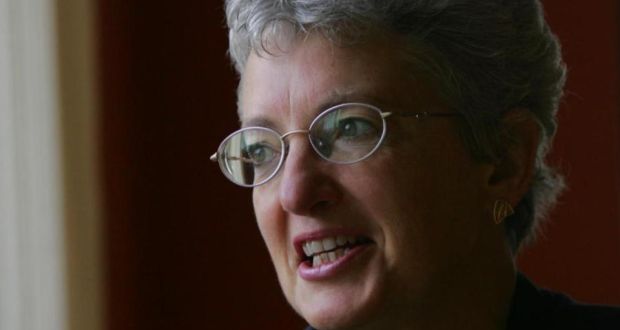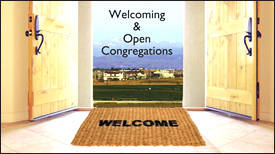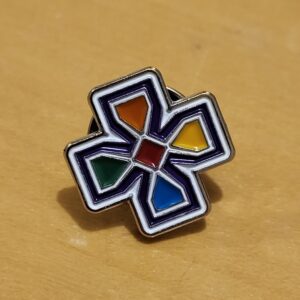
Christ Church Cathedral, Dublin, 17th May 2015
I am blessed to be in your presence today – the Spirit of the God who is Love moves within and through each of you and touches my heart on this day, the day we gather in communion with others throughout Ireland and the world to express our resistance to the fear of lesbian, gay, bisexual and transgender people. I wish to thank Dean Dermot Dunne for his gracious invitation and express my appreciation as well to Reverend Stella Jones. And what a great personal pleasure it is to share this service with my former Trinity College colleague, Reverend Ginnie Kennerley.
I am also blessed because you are a church, a people who create space for a diversity of views on the question of marriage equality and this sends a positive message not only to LGBT people but to other religious denominations and traditions as they debate this issue, and struggle with conflicting deeply held views and beliefs. I want to begin by saying I respect the struggle, I respect those who hold opposing views from my own, and I am affirmed by your invitation and welcome. A very special acknowledgment to the work of Changing Attitude Ireland and Faith in Marriage Equality.
I have titled my address ‘The Promise of Freedom’ because the God ‘who heals those who are broken in heart’ as the psalmist says, is the same God who offers the promise of freedom for those who are oppressed as Luke tells us.
As one raised within the Catholic tradition of the Christian religion I still believe that the powerful interplay between faith and reason is critical for the human journey towards the promise of freedom – found, I still think, in ‘the promised land’. Though my faith or set of beliefs have changed radically over the course of my lifetime I carry always a deep sense that I—and all humans—are created related. I first came across this reasonable interpretation of the meaning of faith within the ‘I-Thou’ theology of the great Jewish thinker Martin Buber. We are created related, Buber said, related to the divine Thou, and through this ‘Thou’ essentially related to one another.
Just imagine now, if this were really true: that it is the core of human identity to be essentially related to every other human in this country and throughout our planet. It would be reasonable then to care for and to be concerned about not only our own individual desires, hopes, dreams and struggles but also those of every other. Such a profound belief or way of viewing humanity, I think, would enable significantly the dismantling of institutionalized homophobia, transphobia and biphobia, and allow the promise of freedom for all to surface.
It is this relational character of reality—now described and analysed at length within the new sciences such as quantum physics as much as it is within the contemporary interpretations of world religions such as Judaism, Christianity and Buddhism—it is this relational character of reality that also provides clues to the meaning of ‘promised land’ and a life of freedom for everyone. The ‘Land’ that I and many other human rights activists seek is a set of laws, systems, social and environmental conditions that enable all people to be free to be the human they were born to be.
We are motivated to seek this land, to seek this realm or ecology of justice and peace, because we care about those who are like us and those who are different from us, those who are family and those who reside outside of familial circles, those who are friends and those whose paths we would not necessarily cross unless we stepped outside of our given social circles and familiar neighborhoods.
We care in these ways because we believe in something beyond ourselves, because we believe that meaning and happiness in our lives ought not to be at the expense of any other and indeed because meaning and happiness is more easily found when we honour a sense of social connectedness that necessarily drives us towards the work of unmaking laws and conditions and systems that keep others down and unfree. The ‘Promised Land’ is decidedly not a metaphor for the realization of dreams of a single individual and her or his family – it is instead a beacon for a social order where no one has to live on the margins because the resources of the centre are shared and because those who make up minorities—whether they are minorities of race, religion, disability or sexual identity—experience the same essential dignity of those who make up the majorities. And the genuine experience of dignity is a quintessential ingredient for the empowerment of every human to lead the life they wish to choose. As Martin Luther King Jr. once said, ‘Whenever men and women straighten their backs up, they are going somewhere, because a man can’t ride your back unless it is bent.’
As a young lesbian, I did not always carry this genuine experience of dignity. Instead I often felt shame – shame for my feelings, shame for my actions, shame for who I was discovering myself to be. I wonder now is that a similar feeling of shame to those in this country who are out of work, to those who have left school early, to those in prison, to those who beg on our streets. What I do know is that shame does bend your back. And what I do know is that shame is never generated from within; it develops as others who are not like you or others who possess more resources/abilities than you suspect that your difference is deviant or treat you as inferior because you do not have what they have. It develops when you run up against laws and systems – fashioned by religious and/or state leaders—that keep you outside the mainstream of social, cultural and economic opportunity or human worth/iness.
All of us take the journey of trying to figure out who we are. The firing of our identity is no doubt one of the greatest projects of our lives. But it is a weighty and significant undertaking I think, not simply for ourselves and those closest to us. It is also an adventure that holds the power to make the world a better place – for ourselves, for everyone. We become who we are within the social, cultural and economic context of our lives. That context fashions who we are up to a point, it defines what it means to be normal in particular ways. But that context can be changed – by our choices, our courage, our imagination. That context can be changed for the better by our resilience and be how we make love in our world. As change-makers we have the power to re-define the meaning of normal, and to bring that re-defined meaning into our social and cultural institutions, including the institution of civil marriage.


